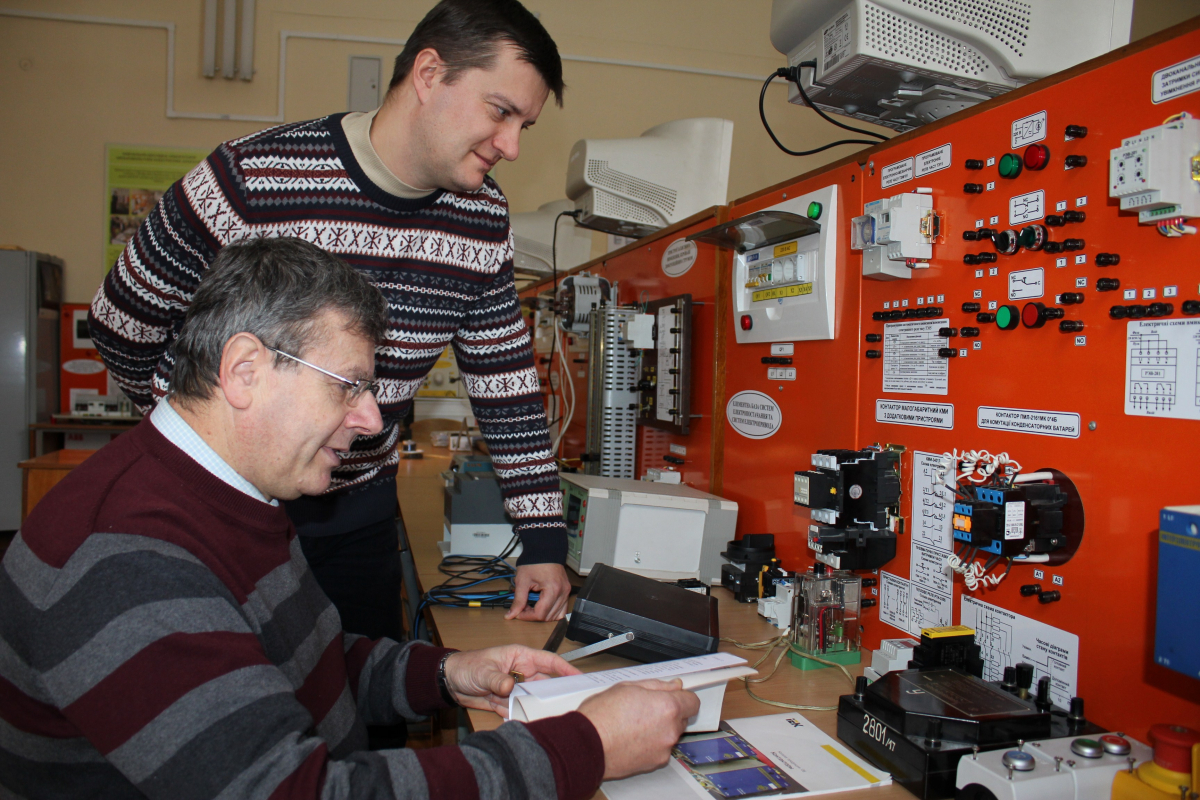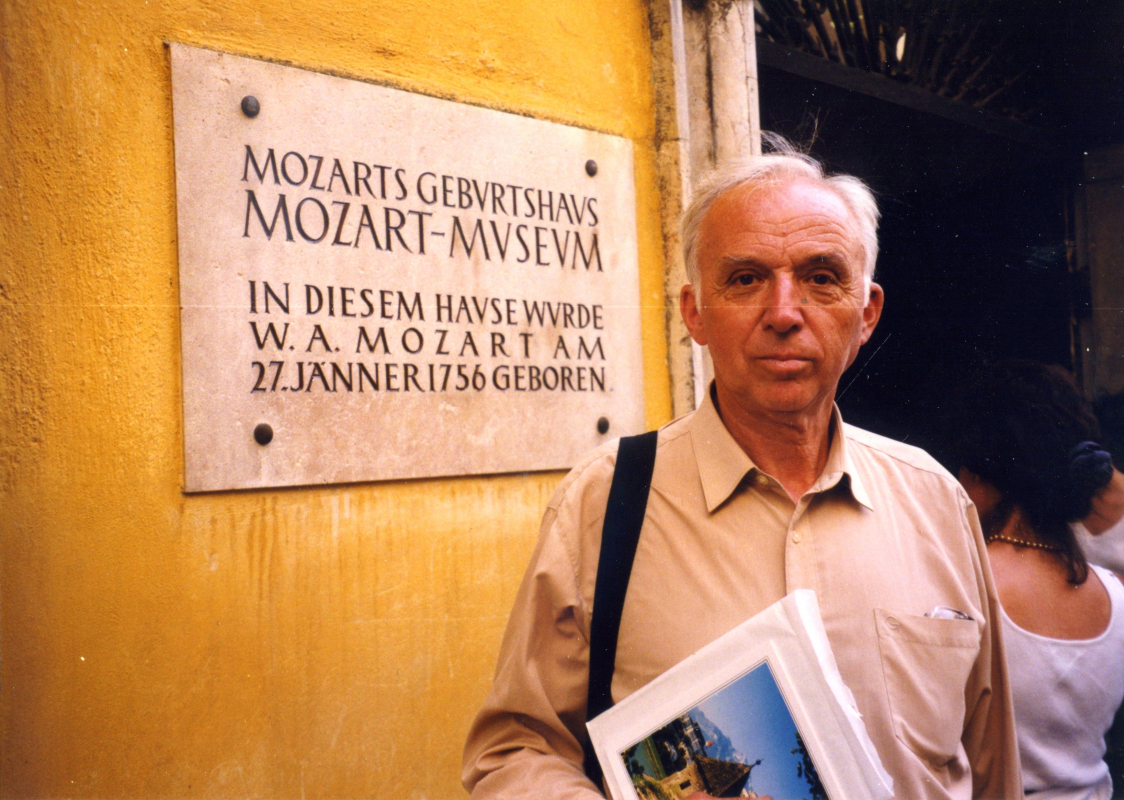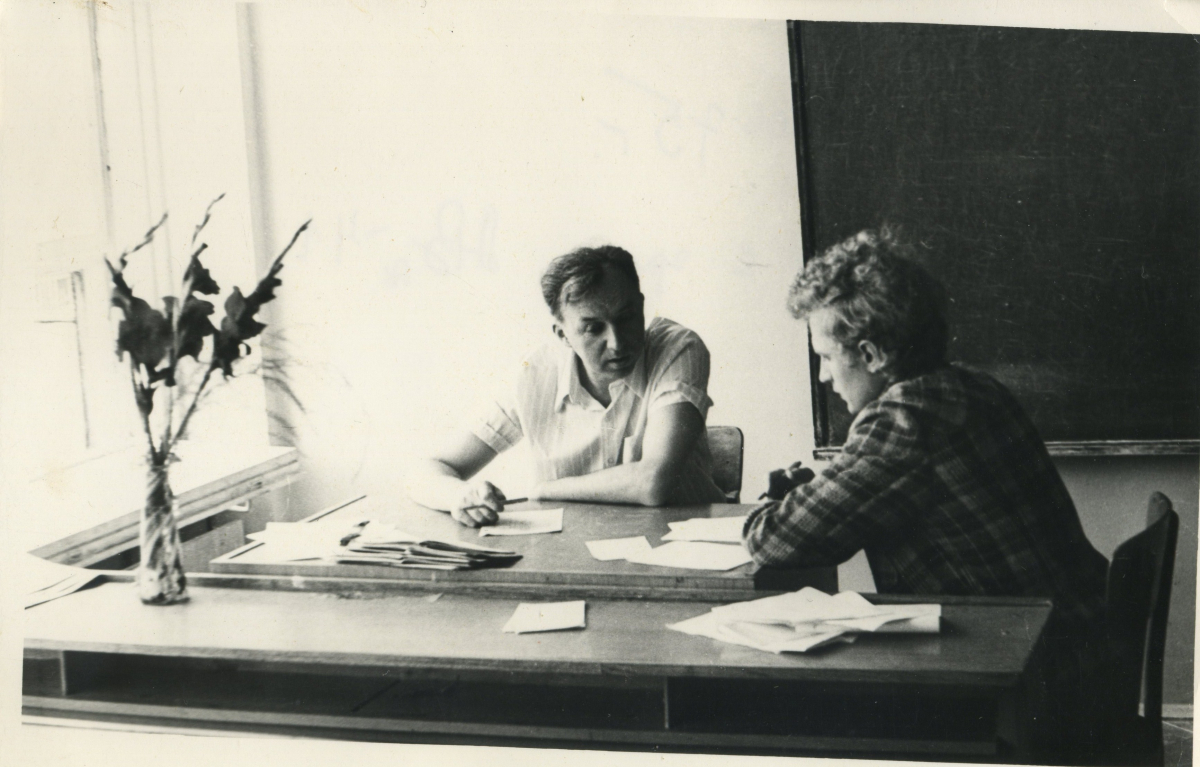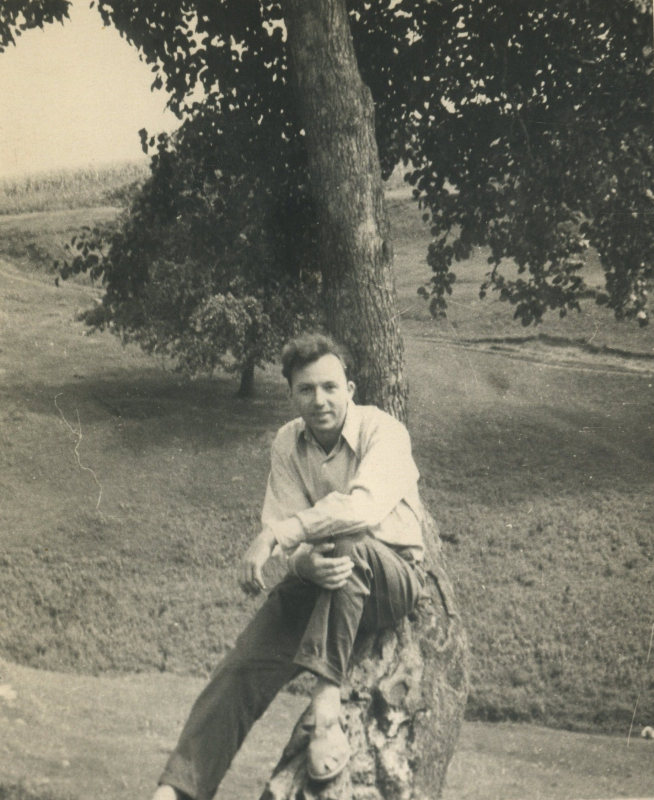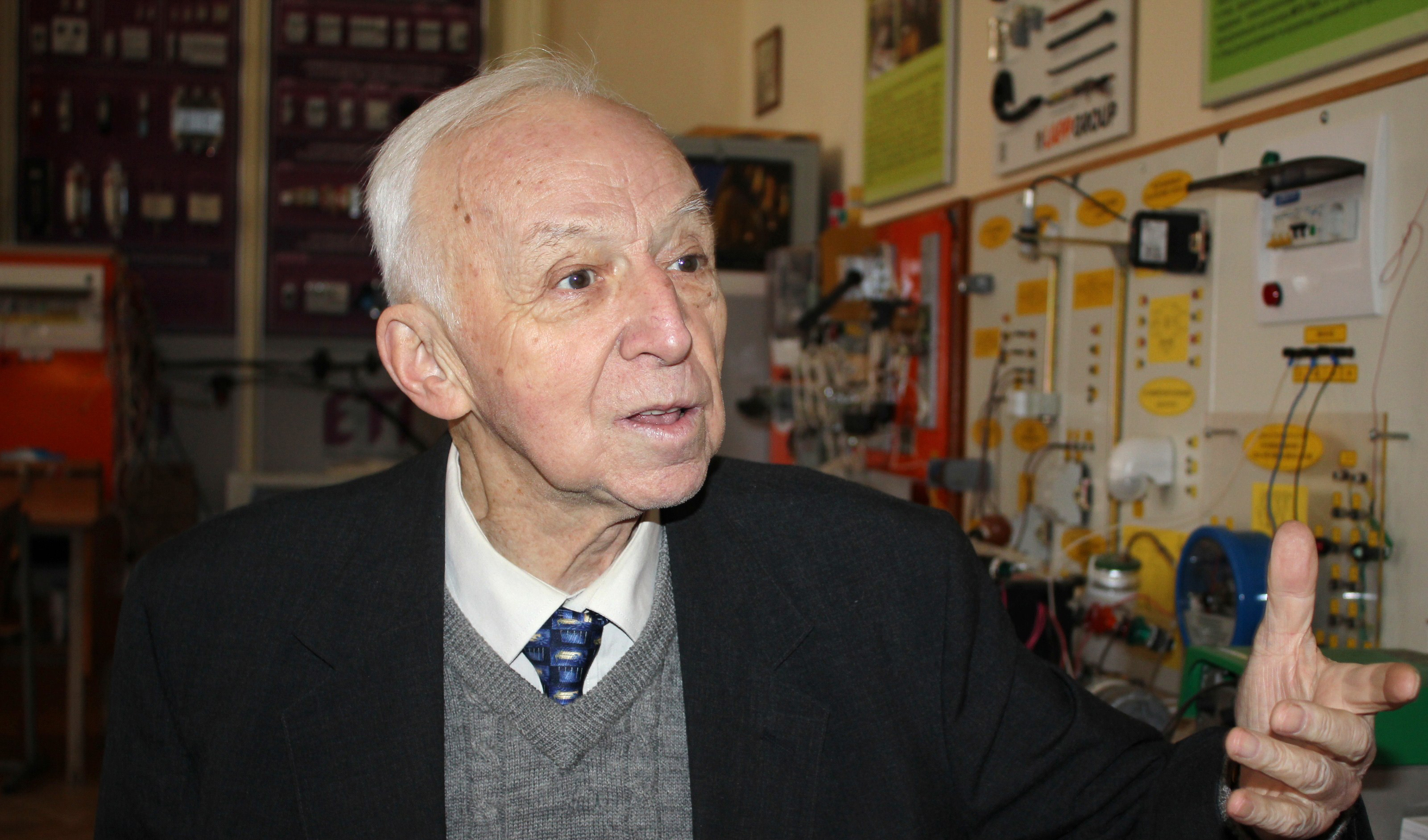No, he is not a person having the same family name as Professor Khrystyna Vasylivna Burshtynska, Head of Lviv Polytechnic «Prosvita». Myron Vasylyovych Burshtynskiy is her husband. He has turned 86. I remember how well he danced at recent charity balls… He is still a member of the University choir «Orpheus». Once I asked Khrystyna Vasylivna whether her husband had an academic title of a candidate or a doctor. She replied, «Myron Vasylyovych deserves to be a professor. It just happened so. He is an engineer at the Department of Electrical Machines,a real engineer of the old school, who is willing to move with the times». By the way, the word ‘engineer’ comes from French ‘inventor’.
Myron Burshtynskiy does not regret not becoming an academic. Paraphrasing a well-known maxim, he claims, «Lviv Polytechnic engineer – it sounds proud!». For many years he has been working as an engineer in the laboratory of low-voltage apparatuses for the distribution and control systems at the Department of Electrical Machines of the Institute of Power Engineering and Control Systems. There are elderly people, who are «deeply retired» but are still employed for different reasons. However, there are such elderly people, who are greatly appreciated by their chiefs. Myron Vasylyovych is one of those. He is 85. Such people are described as «living history». That is why I began my interview not with modern engineering but with the beginning of the life of this extraordinary person:
– I was born in 1931, in a picturesque town of Hrymailiv in Ternopil region, in a common rural family. My father, Vasyl Ilkovych, was a very poor man (an orphan from the age of 9), he did not have enough land. However, he was a very active member of the village «Prosvita». When the church gave a small plot of land, a small co-operative shop was opened there. His life became better when his uncle came from America and bought some land for him. Then, the rural landowner decided to get married. Later, together with a Pole he had worked for, Vasyl Ilkovych opened his own shop in the centre of the village, where he sold various stuff. As people joked, «from a piano to an elephant»…
– Myron Vasylyovych, how was your family treated by the so called liberators that came to Galicia in the autumn of 1939?
– My father was contemptuously called ‘boomster’. All our family had great chances to go to Siberia. However, one Jewish man, who had been friends with my father since their childhood, saved us. He went to serve in the Soviet militia and ha a certain reputation there.
– Did you go to school in the Soviet times?
– I went to the first form of Polish school in 1938. And in 1939, I had to study in the first form again but of the Soviet school.
– And after leaving school, did you choose Lviv Polytechnic straight away?
– Not straight away. At first, I was considering entering the geographical faculty of Franko University. But they required taking exams in the history of the Communist Party of the Soviet Union. You had to know dates of the party congresses and conventions… No, it was not for me. I looked through the program in Mathematics. I knew everything. So I decide to enter the Power Engineering faculty, which combined radio technology and power engineering. Later these specialities were separated. I entered straight away, although the competition was tough, and there were a lot of exams: Mathematics, Chemistry and Physics. There was also a separate exam in Geometry and Algebra.
– Why did you choose «electrical machines» speciality?
– I remembered vividly our village water mill. During the daytime, it ground wheat, and in the evening it was switched to the generator mode. It was a small water power plant. I watched that generator being taken apart…
– What kind of student were you? Did you play truant?
– I was a good student, I had a scholarship. It was not common to play truant in the post-war years. We understood that when we went to work, it would be a shame, if you didn’t know something in your major.
– Were students engaged in academic work in clubs or in some other way?
– At that time, it was not so common as it is now. I was more interested in internship, and I was looking forward to it. We had a three-phase electrical bore for drilling wells. Professor Hubenko gave me a task to design a one-phase bore. It became my diploma project.
– Where did you work after graduating from the institute?
– I became a senior laboratory assistant at the Department of Electrical Machines. I worked for a year, and Professor Hubenko appreciated my work. I was promoted to the position of assistant lecturer. However, soon I had to go to work in the professional college of industrial automatics.
– What made you do this?
– The thing is that my wife, Khrystyna Vasylivna, was already working in Polytechnic taking a position that had nothing to with power engineering. However, Soviet authorities fought nepotism. It was really stupid… In the college of industrial automatics, I acquired a new speciality – digital technology. I also came in closer contact with electronics. One of the courses that I taught was «Digital Circuit Engineering». The knowledge I gained while working in the college became very handy when I returned to work at my department in Polytechnic.
At the beginning of the 1990s, electronics started to be integrated in electrical power engineering industry. Nowadays the segment of electrical apparatuses is up to 60 per cent of the whole electrical engineering products market. Our laboratory is equipped with the simplest safety fuse to the programmed controllers. We have modern protective devices. They include protection of a person form electrical current, protection of the equipment from atmosphere excess voltage, from emergency modes. Then there are switching apparatuses: switching on and off main circles, control and alarm circles apparatuses. We have devices from the simple relay technology to controllers. We have always understood that a competitive expert for modern job market can be trained only in laboratories equipped with the state-of-the-art devices of the leading world companies. Now our achievements and our pride include electrical equipment of such companies as Siemens, Eaton-Meller, АВВ, Schneider, ЕТІ, Сhint, IEK, Ukrainian company Novatech. Not so long ago, we received a present from the company Hager: several modules of power supply, protection and switching for electrical engines and low-voltage distribution networks. The approximate cost of this equipment is 100,000 hrn.
I would like to say that my colleague, Associate Professor Mykhailo Khai, is not only a good expert but also a wonderful education manger. He keeps an eye on our alumni that work for Ukrainian branches of the above mentioned companies and persuade their chiefs to provide us with the state-of-the-art equipment. Professor Orest Lozynskiy, former Director of our Institute, also takes care of this. Orest Yulianovych has always felt constant support of Professor Yuriy Bobalo, Lviv Polytechnic Rector. Now we are not ashamed to show our infrastructure to guests and experts in the field of power engineering.
However, state-of-the-art equipment is not everything. Together with Mykhailo Khai, we made all the posters, so that students would have an opportunity to use this equipment for laboratory work .apart from this, we prepared educational and methodological materials: we published two manuals and two textbooks. The recent textbook «Protection and control apparatuses in low-voltage electrical applications» was awarded third prize in Lviv Polytechnic publications competition.
– Myron Vasylyovych, a lot of retired people continue working because of low pension. What are your motives?
– Not material ones. I feel that I am able to teach students something. I am also afraid to stop socializing. Elderly people suffer most not from ailment, but from loneliness. My wife advised me to retire, but now she has understood it is a waste of time. I will feel when I become a burden for colleagues…
Now I enjoy going to work, talking to students and colleagues. I don’t forget about trips to our picturesque Carpathians.
